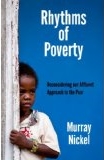Mennonite Health Journal
Articles on the intersection of faith and health
Rhythms of Poverty: Reconsidering our Affluent Approach to the Poor
Book by Murray Nickel, MD
Review by Paul D. Leichty
from Mennonite Health Journal, Vol. 16, No. 1 – February 2014
For I do not do the good I want, but the evil I do not want is what I do. Romans 7:19 (NRSV)
The apostle Paul outlines our common human dilemma, especially among those of us who claim faith. Murray Nickel, in his book, Rhythms of Poverty, presents the stark implications of this dilemma for affluent North American Christians who want to “help the poor.”
Nickel speaks from a life of first-hand experience. He grew up as a child of Canadian Mennon ite Brethren missionary parents in what is now the Democratic Republic of the Congo. He came back to North America for his education leading to his present work as an emergency room physician in suburban Vancouver, British Columbia. On the very first page of the book, in the “Acknowledgments” section, he confesses to a “self-absorbent ego.” Yet he continued to struggle to come to terms with his own rich reservoir of resources when compared to the ordinary people of the country in which he grew up.
ite Brethren missionary parents in what is now the Democratic Republic of the Congo. He came back to North America for his education leading to his present work as an emergency room physician in suburban Vancouver, British Columbia. On the very first page of the book, in the “Acknowledgments” section, he confesses to a “self-absorbent ego.” Yet he continued to struggle to come to terms with his own rich reservoir of resources when compared to the ordinary people of the country in which he grew up.
In the “Introduction,” Nickel lays out the scenario in stark terms with a representative story of a charitable non-governmental organization (NGO) coming into a poor village to start a medical clinic. The problem comes when the NGO’s actions squeeze out a local medical provider who has left a comfortable life in the city to go back and help his village. Since the local provider can’t compete with all of the outside resources, he closes his practice and moves back to the city. After a few years, the new clinic flounders and the NGO decides to invest its resources elsewhere. The result leaves the village with no medical providers and in a worse situation than where they started.
In the first several chapters, Nickel introduces us to the book’s overriding metaphor, rhythms, and its central goal, compassion. What does it mean to show compassion in the midst of the rhythms of life and the “Rhythms of Poverty” from the “big village” of 10 million people that is the capital of Kinshasa to the small remote villages in this vast expanse of land?
Nickel realizes that often affluent Westerners have responded with pity rather than compassion. Pity starts with a “deficit model” of poverty. I have resources and you don’t; therefore, I will share out of pity for your deficit. In contrast, Nickel describes compassion as recognizing that everyone has something to offer. In every situation, there are resources; there are assets. Problems are addressed not by pouring in resources from the outside to deal with the deficits, but rather by cultivating the inherent assets of the community itself to address their own felt needs.
This approach of “Asset-Based Community Development” has been popularized in the U.S. through the work of John McKnight and John (“Jody”) Kretzmann at Northwestern University. During the 1981-82 school year, I was part of a group of seminary students challenged by McKnight to explore the relationship of this budding “asset-based” movement to Christian faith. For me, Jesus’ words in John 15:15 (NRSV) are key: I do not call you servants any longer, because the servant does not know what the master is doing; but I have called you friends, because I have made known to you everything that I have heard from my Father.
McKnight later went on to challenge the Christian community in The Other Side magazine with the provocative title, “Why ‘Servanthood’ is Bad.”[1] He pointed out that the common Christian servanthood stance is really a disguised form of the old master-slave relationship. Since I as the affluent Westerner and the educated professional have the resources and the knowledge that you don’t have, I have power over you to “minister” to your deficits.
Nickel struggles with this reality throughout Rhythms of Poverty. “Where are the assets?” he asks, as it relates to the stark reality he finds in the Congo today. It is one thing to affirm in theory that people in a rural village in the Congo have dignity and worth and even resources to share, but quite another to mobilize those assets, deal with the urgency of extreme poverty, and share as equals in the relationship. Thus, in the middle section of the book, Nickel explores the Golden Rule and the many forms of compassion that he sees from his experience of working in the Congo. These form an arc in intensity and commitment as evidenced by his chapter titles: Fleeting Compassion, Committed Compassion, Strategic Compassion, Sharing Compassion. Then the arc comes crashing down with Chapter 8, “Burnt Out Compassion.”
Along the way, the reader gets mentally involved in the many fascinating stories that Murray has to tell. We follow him on the intellectual journey of understanding the pitfalls that accompany each attempt to do good. We see his journey of attempted partnership with Dr. Delphin Kapasa in the poor Kinshasa neighborhood of Camp Luka. We gain understanding from Murray Nickel’s own research and experience in the history and background of the places he takes us.
In the end, Nickel cites three qualities that characterize Christian compassion: justice, mercy, and humility. He discusses various notions about justice from Socrates to Liberation Theology. He describes the horrible situations of war and violence in central Africa and yet lifts up stories of mercy in the midst of the chaos. He talks about the meaning of humility and the use of power.
Although professing a profound ambivalence about the affluent Western obsession with “methods” in dealing with poverty, Murray Nickel nevertheless discusses methods at the end of the book. Without being able to go into much depth, he nevertheless gives a helpful analysis of methods ranging from needs assessment survey to Result-Based Management to consultative meetings.
In the end, he focuses on what it means to create true and viable partnerships in the developing world. He stresses the need for a shared vision, strong and respectful cross-cultural relationships, and careful attention to the real results of our actions.
The final chapter comes back to the “rhythms” metaphor to ask the big question: Is there transformation taking place? Or is it merely adaptation to a new set of circumstances? The parable of the mustard seed forms the paradigm for this notion of transformation.
Rhythms of Poverty is a sobering reminder of how human pride at many levels can subvert and destroy God’s movement for peace and justice, for health and wholeness in our world today. While his ideas are not new, Murray Nickel has helpfully brought together many important ideas and movements which have informed a more complete and wholesome view of medical mission and Christian community development in the 21st century. I commend the book to anyone interested in the ongoing struggle to develop a truly compassionate response in the midst of the issues of affluence and poverty in our world.
Rhythms of Poverty: Reconsidering our Affluent Approach to the Poor by Murray Nickel is available in paperback or electronic format on Amazon.
Citations: [1] McKnight, J. (1989, January-February -). “Why ‘Servanthood’ is Bad”. (Reprinted with permission from The Other Side, Jan-Feb 1989) Retrieved January 31, 2014, from DePaul University: https://steans.depaul.edu/faculty/docs/mcknight.pdf
Retrieved May 28, 2020 from https%3A%2F%2Fresources.depaul.edu%2Fabcd-institute%2Fpublications%2FDocuments%2F1995_WhyServanthoodIsBad.pdf
About the author
 Murray Nickel, MD, is President of International Mennonite Health Association (IMHA) and an emergency physician living in Abbotsford, British Columbia, just outside of Vancouver. He spent six years in Congo in association with Mennonite Brethren Mission and now travels back and forth between Congo and Canada two or three times a year. He has a special interest in human development and transformation in the context of the poverty.
Murray Nickel, MD, is President of International Mennonite Health Association (IMHA) and an emergency physician living in Abbotsford, British Columbia, just outside of Vancouver. He spent six years in Congo in association with Mennonite Brethren Mission and now travels back and forth between Congo and Canada two or three times a year. He has a special interest in human development and transformation in the context of the poverty.
 Paul D. Leichty, M.Div. is Executive Director Emeritus, having served as the first Executive Director of Mennonite Healthcare Fellowship (MHF) from Sept. 2011 through May 2020. Paul has served as a pastor, church musician, computer support person, disabilities advocate, and administrator/organizer of a number of church-related ministries. Paul also served as Executive Director of Congregational Accessibility Network which was transformed in 2022-23 to Disability Ministry Network. He is a member of Agape Fellowship of the Mennonite Church in Williamsport, Pennsylvania where he lives with his wife, Twila Charles Leichty.
Paul D. Leichty, M.Div. is Executive Director Emeritus, having served as the first Executive Director of Mennonite Healthcare Fellowship (MHF) from Sept. 2011 through May 2020. Paul has served as a pastor, church musician, computer support person, disabilities advocate, and administrator/organizer of a number of church-related ministries. Paul also served as Executive Director of Congregational Accessibility Network which was transformed in 2022-23 to Disability Ministry Network. He is a member of Agape Fellowship of the Mennonite Church in Williamsport, Pennsylvania where he lives with his wife, Twila Charles Leichty.
